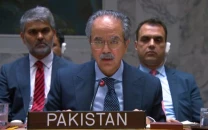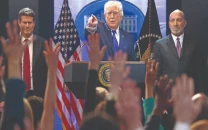The growing turmoil in Afghanistan
Should Afghan Taliban reign supreme in Afghanistan, their brethren in Pakistan will increasingly use it as safe haven.

The writer is a Master’s student at The Fletcher School of Law and Diplomacy. He tweets @uzairyounus
Hamid Karzai is holding out on signing the BSA to secure better terms but by doing so, he is risking the future security of his nation. Without the BSA, American and Nato troops will leave Afghanistan at the end of 2014, leaving behind a massive security vacuum. Such a move would also lead to the suspension of billions of dollars in military aid that is necessary to sustain the Afghan National Army. Starved of funds, chances are that the Afghan Army will splinter off into multiple groups and a situation similar to the civil war witnessed in the 1990s would emerge. For the international community and especially the Americans, a collapsing Afghan state would be a catastrophic failure.
With presidential elections looming, one could argue that Hamid Karzai is playing bad cop to appeal to the Afghan Taliban and his ethnic Pashtun base that has been marginalised since the American occupation. By doing so, he is playing with fire — with Americans already withdrawing, such public vilification of America will only embolden the Afghan Taliban and make it tougher for lasting peace in the country. By launching an onslaught against an Afghan Army starved of foreign support and funds, the Afghan Taliban will be able to quickly exert control over vast amounts of territory and challenge the rulers in Kabul. From this position of strength, the Afghan Taliban will increase their demands and vie for absolute rule over the country.
A well-trained Afghan Army short on money will, in all likelihood, splinter into various militant groups based on ethnic and tribal allegiances. Despite the vast amounts of money spent by international forces, the Afghan Army continues to have high desertion rates. Tribal and ethnic identities in Afghanistan are far more alluring than a national Afghan identity and without a government capable of paying salaries, there will be no need for the soldiers to stick together. A resurging Afghan Taliban could be able to co-opt some elements from the Afghan Army, further weakening Kabul’s power and increasing risks of a collapse of government.
After the withdrawal of the Soviet Union, the Afghan mujahideen, in particular al Qaeda and the Afghan Taliban, used propaganda to build up support, not just nationally, but internationally. For thousands of young men in the Muslim world, these fighters in Afghanistan emerged as heroes, boosting the rank and file of al Qaeda in the years to come. Should the Americans withdraw from Afghanistan in 2014, the Afghan Taliban are set to conduct a similar propaganda campaign that establishes them as victors over not one, but two superpowers in modern times. Militant groups in Iraq, Syria, Pakistan and North Africa will be emboldened by such a development, leading to a rise in militancy and non-state actors challenging governments across the Muslim world.
While Hamid Karzai has been secretly negotiating with the Afghan Taliban, the Pakistan government has also officially started peace talks with militant groups in Pakistan. By all accounts, both the Afghan Taliban and militants in Pakistan have the same ideology. Should the Afghan Taliban reign supreme in Afghanistan, their brethren in Pakistan will increasingly use Afghan territory as a safe haven. Should peace talks fail in Pakistan, this safe haven will then be used to destabilise Pakistan.
A resurging Afghan Taliban in the region will also unnerve India, as Indian-held Kashmir will be the next target for radicals successfully challenging the Pakistani state. Unable to contain and control radical outfits on its own territory, the Pakistani security establishment could, in all likelihood, divert the militants away from its territory into Indian-held Kashmir. Pakistan’s security establishment for decades has followed this policy and it is likely that it will do so again should militants become uncontrollable at home.
Iran will also be concerned with a deteriorating situation in Afghanistan. While the Afghan Taliban may not directly destabilise Iran, they could harbour anti-Iranian groups, such as Jundullah, on their territory. Jundullah could use the Afghan Taliban-controlled Afghanistan as a safe haven where they can train and arm themselves and conduct attacks inside Iran. Iran is already dealing with instability in the west as Iraq and Syria continue to burn. A collapsing Afghanistan will be a dire development as it will create tension on both its eastern and western fronts.
Shah Shuja, the ill-fated ruler of Afghanistan put in place by the British in 1839, began to take a tough stance against the British towards the end of his reign. Sensing that the British were about to leave, he openly criticised them in a bid to bolster internal support. When the British did leave, however, Shuja immediately lost power and was assassinated by his opponents in 1842.
Hamid Karzai has studied this history and has often said that he is not Shah Shuja. However, he is acting like Shah Shuja at this point in time. Should the Americans leave and not sign the BSA, his end is likely to be one that is similar to Shuja’s death. However, this time around, it will not just be Afghanistan that is sent into turmoil again. Events in Afghanistan will reverberate across the entire region and a collapsing Afghan state will throw Southwest Asia into a state of chaos and disarray.
Published in The Express Tribune, February 20th, 2014.
Like Sports on Facebook, follow @ETribuneSports on Twitter to stay informed and join in the conversation.



















COMMENTS
Comments are moderated and generally will be posted if they are on-topic and not abusive.
For more information, please see our Comments FAQ